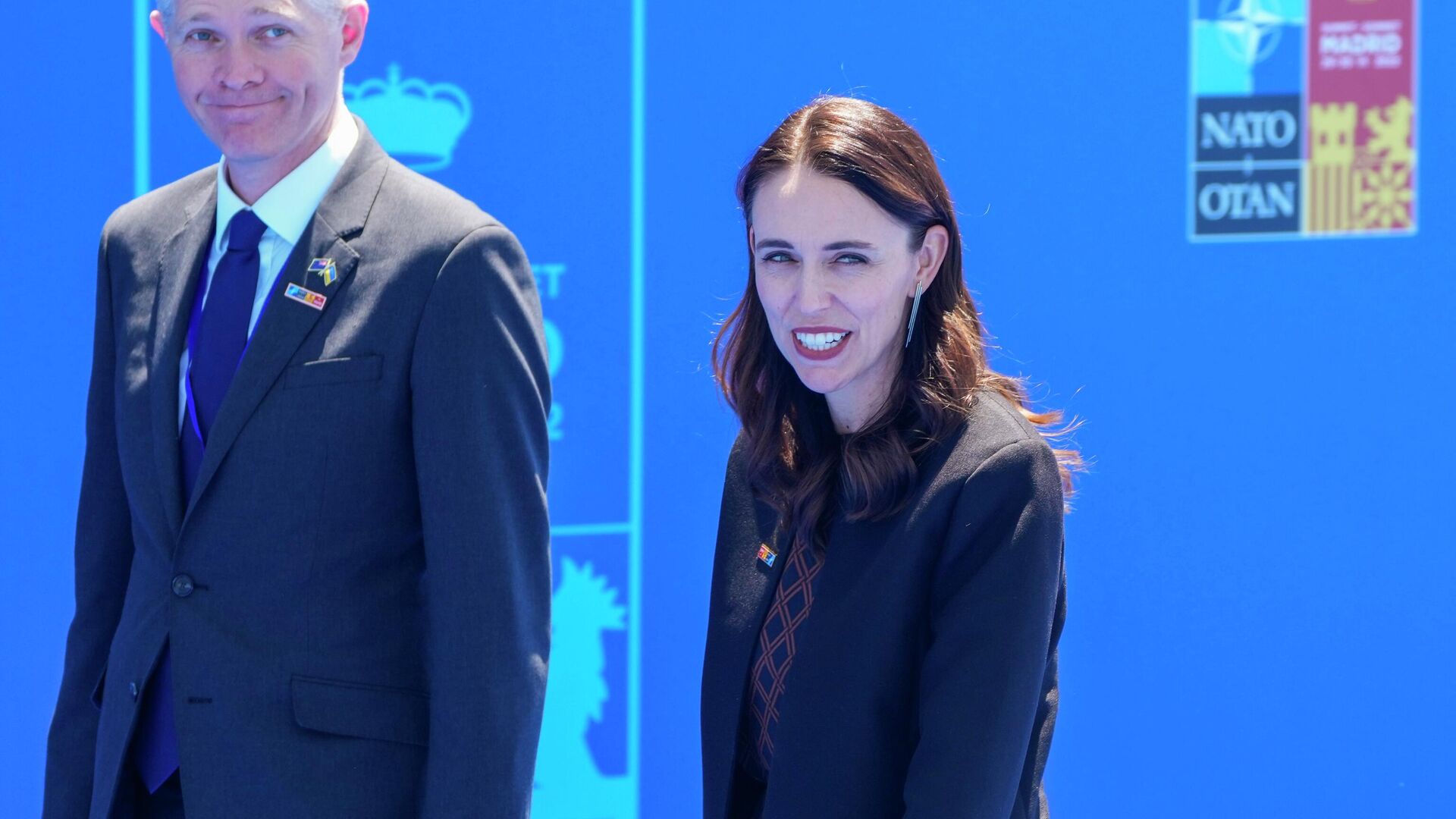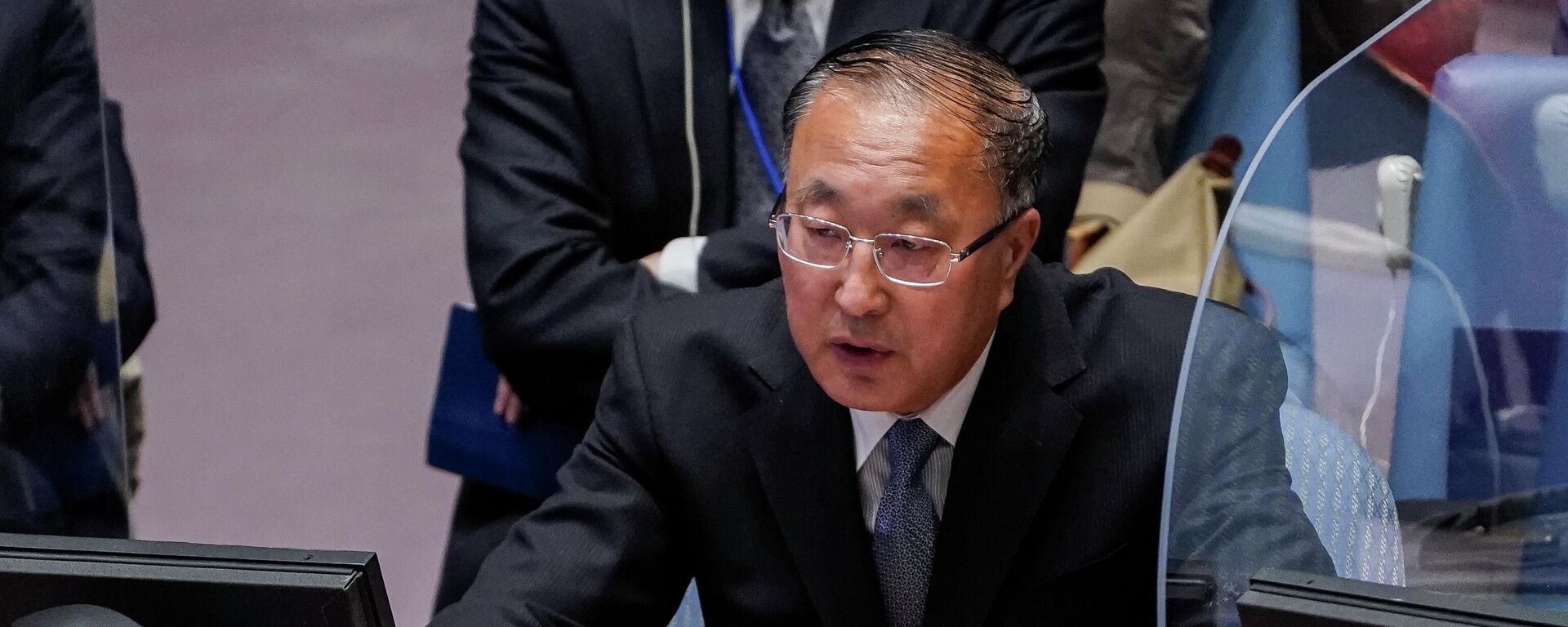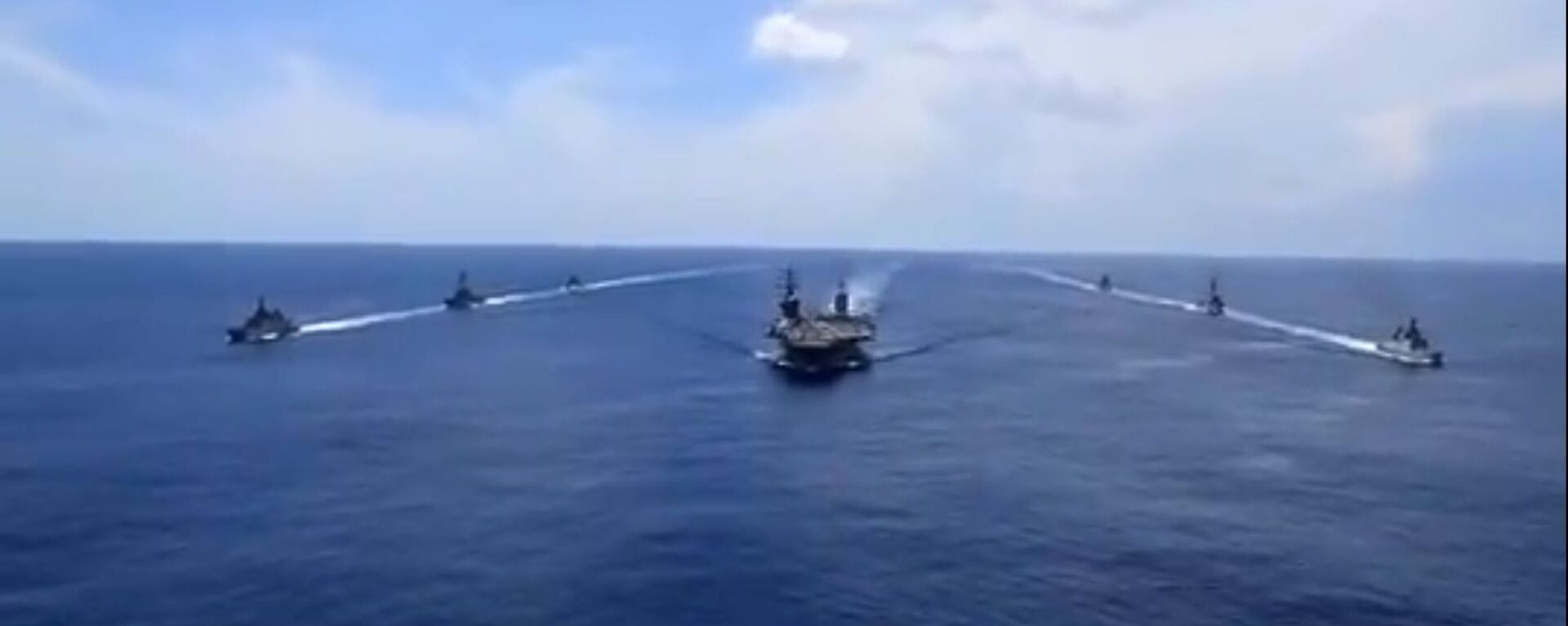https://sputnikglobe.com/20220630/militarization-of-south-pacific-not-being-fuelled-by-china-beijing-slams-kiwi-pms-nato-speech-1096832885.html
‘Militarization’ of South Pacific Not Being ‘Fuelled’ by China: Beijing Slams Kiwi PM’s NATO Speech
‘Militarization’ of South Pacific Not Being ‘Fuelled’ by China: Beijing Slams Kiwi PM’s NATO Speech
Sputnik International
In its new ‘Strategic Concept’ document unveiled on Wednesday, NATO for the first time addressed the “systemic challenges” represented by China. In order to... 30.06.2022, Sputnik International
2022-06-30T12:31+0000
2022-06-30T12:31+0000
2022-10-19T18:35+0000
china
nato
new zealand
pacific ocean
jacinda ardern
australia
us
asia
https://cdn1.img.sputnikglobe.com/img/07e6/06/1e/1096834422_0:0:3072:1728_1920x0_80_0_0_ed2ee4017ff7c43ba9db94e7249bbdb2.jpg
The Chinese Embassy in New Zealand has hit out at the country's Prime Minister Jacinda Ardern, who blamed Beijing for rising tensions in the South Pacific region.In a speech delivered at a session on the sidelines of the NATO Leaders’ Summit in Madrid on Wednesday, Ardern accused China of becoming “more assertive and more willing to challenge international rules and norms”.“We must respond to the actions we see. We must stand firm on the rules-based order,”o Ardern said.The Chinese embassy on Thursday described Ardern’s remarks as “regrettable” and “wrong”.“Such cooperation has nothing to do with the militarization of the region. If militarization does exist in the South Pacific, it is clear to all who and what is fueling such tensions,” the embassy statement added, in what appeared to be a criticism directed at the US, Australia and New Zealand, the three traditional powers in the South Pacific region since the end of the World War II.Both Australia and New Zealand are treaty allies of the US in the trilateral ANZUS (Australia, New Zealand and the US) Treaty as well as in Five Eyes (FVEY) intelligence alliance, latter also comprising Canada and the UK. Additionally, Australia, the US and the UK also announced a trilateral AUKUS arrangement last September. Under AUKUS, the Royal Australian Navy (RAN) would get access to technology to develop advanced nuclear-powered attack submarines (SSNs).The ‘Indo-Pacific’ strategies of many Western partners, including the US, Australia and EU among others, have advocated for a “rules-based” international order, which Beijing sees as ploys to contain its rising global influence.Beijing said that its involvement in the region around New Zealand was to help the Pacific Island Nations (PINs) to ”enhance their development capacity” and help them combat climate change, which has been described as the “biggest threat” facing the region. In this regard, the Chinese diplomats reiterated Beijing’s previous offers of entering into developmental partnerships with Australia and New Zealand in order to help the Pacific nations.The South Pacific region has of late found itself embroiled in a geopolitical contest of sorts after China and the Solomon Islands unveiled their security framework agreement in April. In the lead-up to the unveiling of the Sino-Solomon pact, Beijing had been harshly critical of the AUKUS pact and has squarely blamed the US for inciting a “nuclear arms race” in the region.The pact between China and Solomon Islands has raised hackles in Australia, New Zealand and the US, who claimed it could “fuel international tensions”.
https://sputnikglobe.com/20220629/cold-war-script-must-never-be-re-enacted-in-asia-pacific-china-opposes-natos-strategic-concept-1096774858.html
https://sputnikglobe.com/20220511/china-accuses-aukus-countries-of-inciting-arms-race-in-south-pacific-1095432301.html
china
new zealand
pacific ocean
australia
Sputnik International
feedback@sputniknews.com
+74956456601
MIA „Rossiya Segodnya“
2022
News
en_EN
Sputnik International
feedback@sputniknews.com
+74956456601
MIA „Rossiya Segodnya“
Sputnik International
feedback@sputniknews.com
+74956456601
MIA „Rossiya Segodnya“
china, nato, new zealand, pacific ocean, jacinda ardern, australia, us
china, nato, new zealand, pacific ocean, jacinda ardern, australia, us
‘Militarization’ of South Pacific Not Being ‘Fuelled’ by China: Beijing Slams Kiwi PM’s NATO Speech
12:31 GMT 30.06.2022 (Updated: 18:35 GMT 19.10.2022) In its new ‘Strategic Concept’ document unveiled on Wednesday, NATO for the first time addressed the “systemic challenges” represented by China. In order to counter Beijing’s growing clout, NATO has vowed to work with Australia, New Zealand, Japan and South Korea, which were invited to a NATO Summit for the first time in the alliance's history.
The Chinese Embassy in New Zealand has hit out at the country's Prime Minister Jacinda Ardern, who blamed Beijing for rising tensions in the South Pacific region.
In a speech
delivered at a session on the sidelines of the NATO Leaders’ Summit in Madrid on Wednesday, Ardern accused China of becoming “more assertive and more willing to challenge international rules and norms”.
“We must respond to the actions we see. We must stand firm on the rules-based order,”o Ardern said.
The Chinese embassy on Thursday described Ardern’s remarks as “regrettable” and “wrong”.
“If there is indeed an escalation of tension in the Pacific, it cannot have been caused by China's cooperation with its island partners to advance sustainable development,” the Chinese Embassy said in a statement on Thursday.
“Such cooperation has nothing to do with the militarization of the region. If militarization does exist in the South Pacific, it is clear to all who and what is fueling such tensions,” the embassy statement added, in what appeared to be a criticism directed at the US, Australia and New Zealand, the three traditional powers in the South Pacific region since the end of the World War II.
Both Australia and New Zealand are treaty allies of the US in the trilateral ANZUS (Australia, New Zealand and the US) Treaty as well as in Five Eyes (FVEY) intelligence alliance, latter also comprising Canada and the UK.
Additionally, Australia, the US and the UK also announced a trilateral AUKUS arrangement last September. Under AUKUS, the Royal Australian Navy (RAN) would get access to technology to develop advanced nuclear-powered attack submarines (SSNs).
The Chinese embassy further remarked that Beijing was committed to uphold “multilateralism” in its global outlook, as it criticized a “small number of countries” which it said are trying to “impose” their own values in the garb of “rules-based order”.
The ‘Indo-Pacific’ strategies of many Western partners, including the US, Australia and EU among others, have advocated for a “rules-based” international order, which Beijing sees as ploys to contain its rising global influence.
The Chinese Embassy in Wellington, while critical of the Kiwi leader, added in its statement that it had also noted Ardern’s remarks about New Zealand having a “fiercely independent” foreign policy.
Beijing said that its involvement in the region around New Zealand was to help the Pacific Island Nations (PINs) to ”enhance their development capacity” and help them combat climate change, which has been described as the “biggest threat” facing the region. In this regard, the Chinese diplomats reiterated Beijing’s previous offers of entering into developmental partnerships with Australia and New Zealand in order to help the Pacific nations.
The South Pacific region has of late found itself embroiled in a geopolitical contest of sorts after China and the Solomon Islands
unveiled their security framework agreement in April.
Further concerns have been expressed by the Western allies over Beijing’s attempts to sign a region-wide deal with South Pacific countries, which it says would promote “cooperative and sustainable security, so as to promote regional peace and security”.
In the lead-up to the unveiling of the Sino-Solomon pact, Beijing had been harshly critical of the AUKUS pact and has squarely blamed the US for inciting a “nuclear arms race” in the region.
The pact between China and Solomon Islands has raised hackles in Australia, New Zealand and the US, who claimed it could “
fuel international tensions”.
A joint statement released after the meeting between Ardern and US President Joe Biden at the White House on June 1 said that “persistent military presence in the Pacific by a state that does not share our values or security interests would fundamentally alter the strategic balance of the region and pose national-security concerns to both our countries.”




